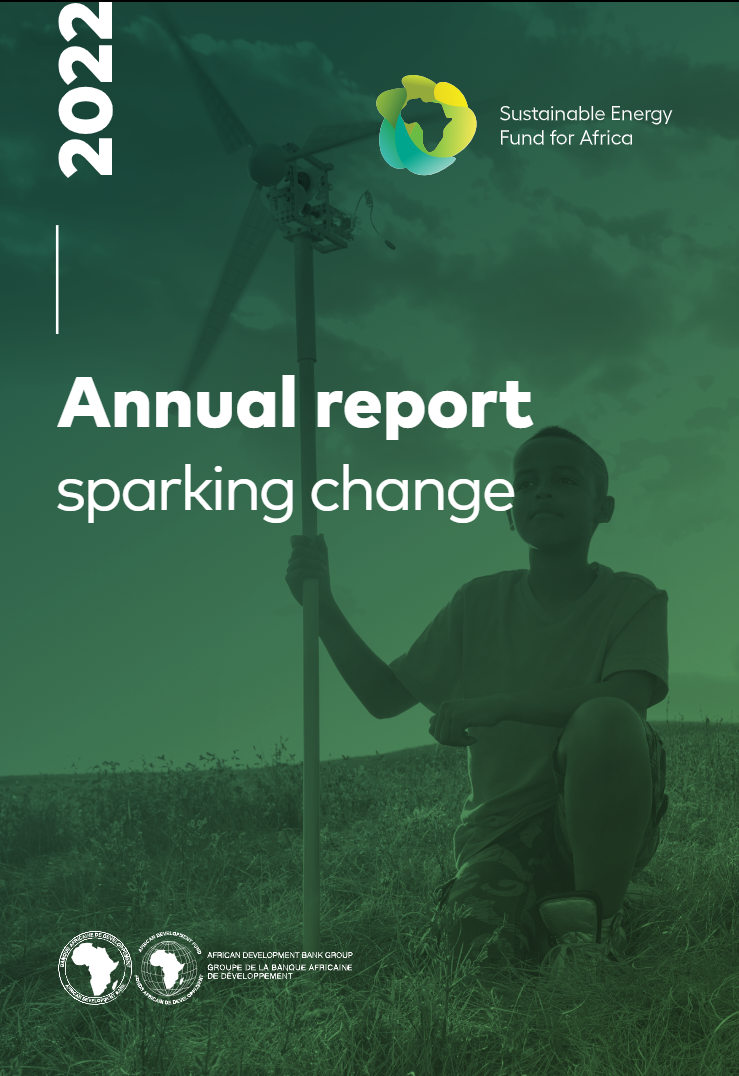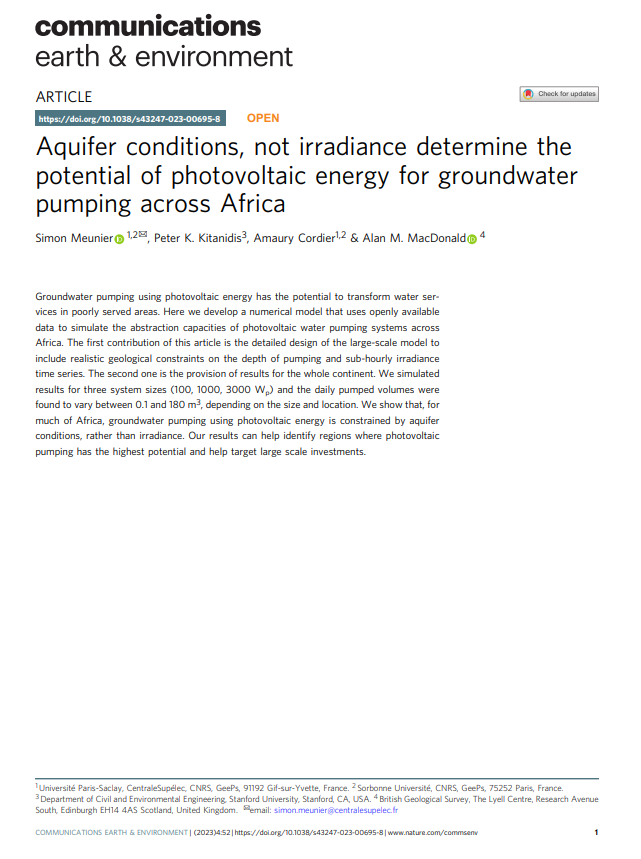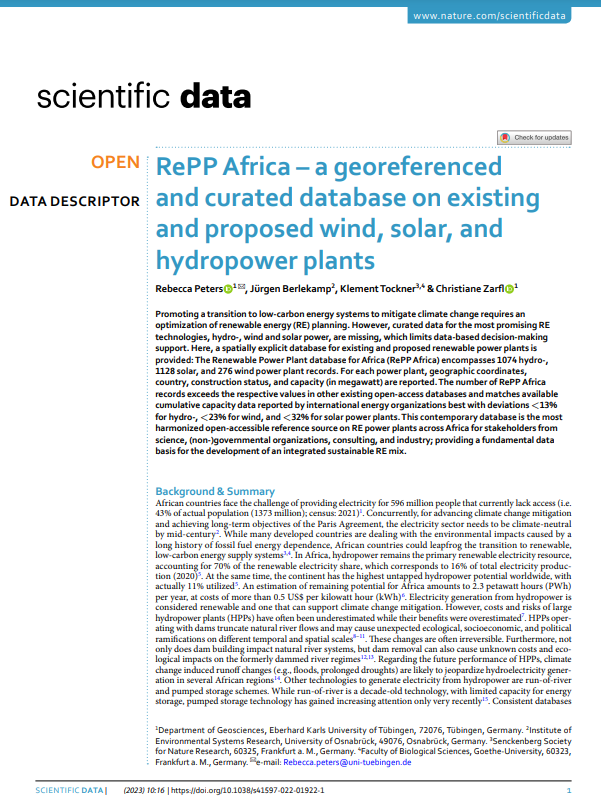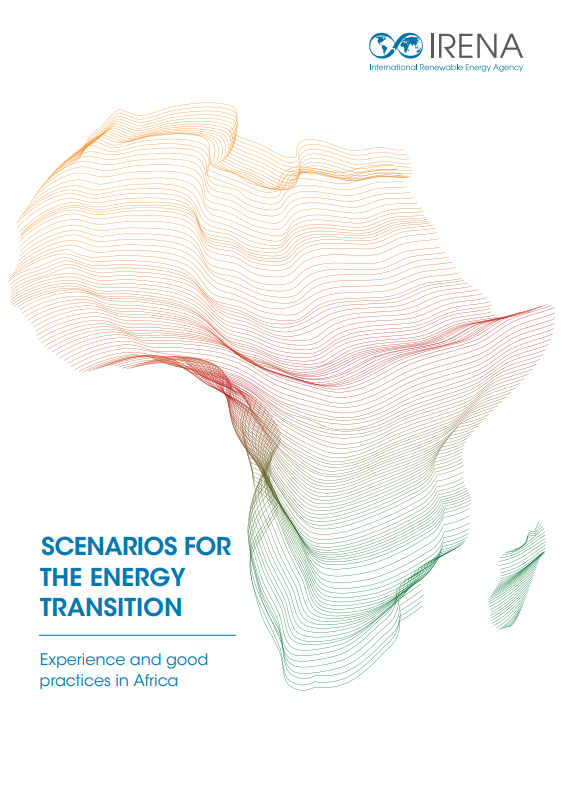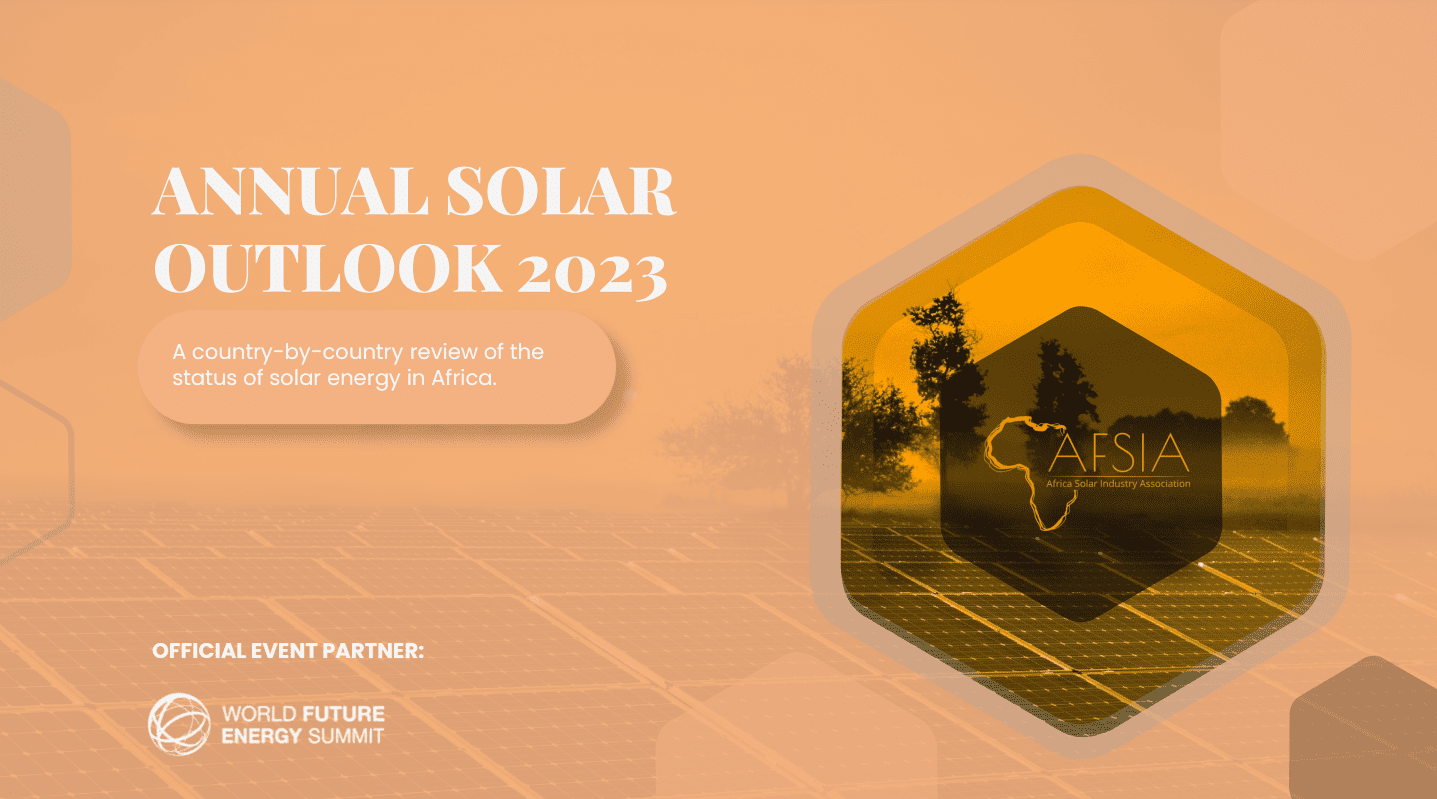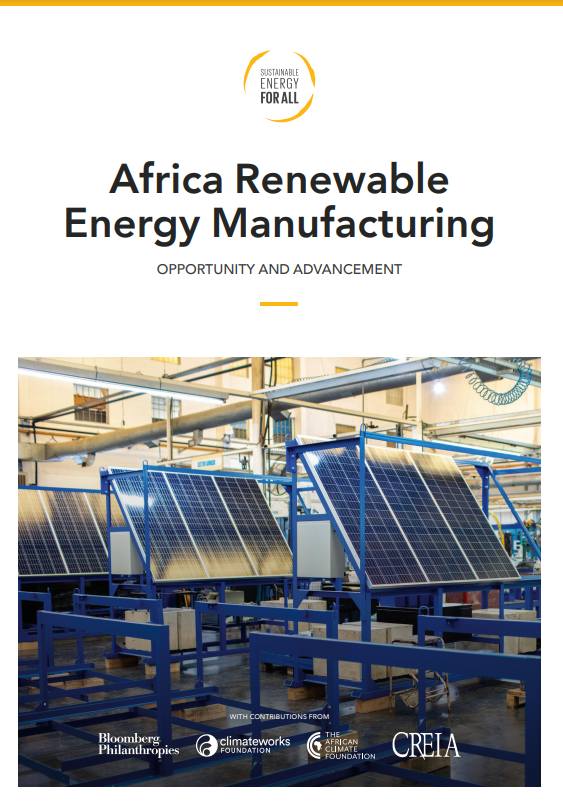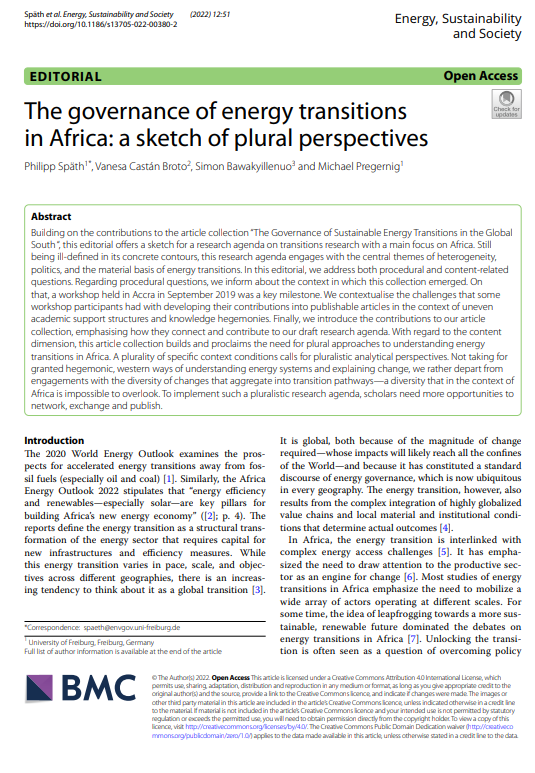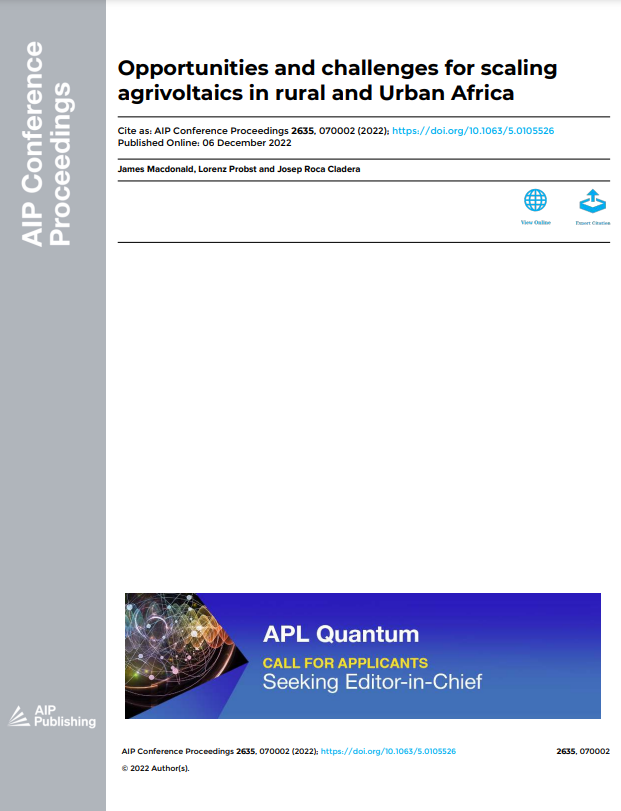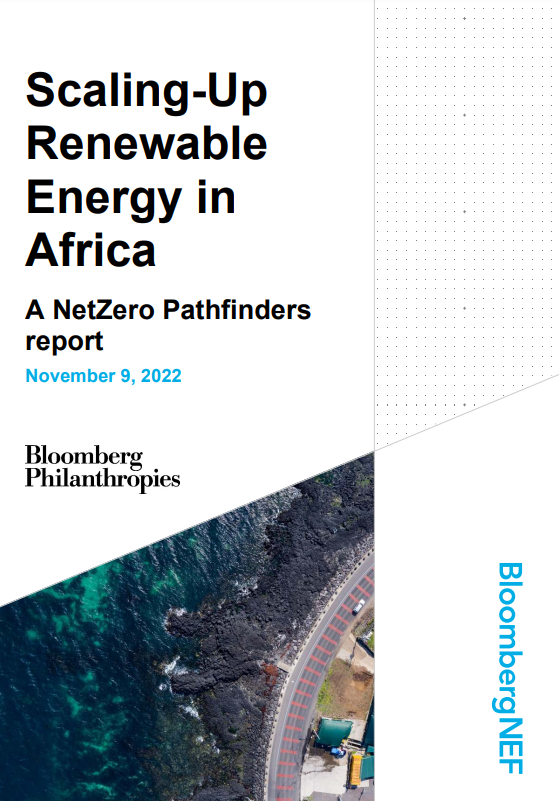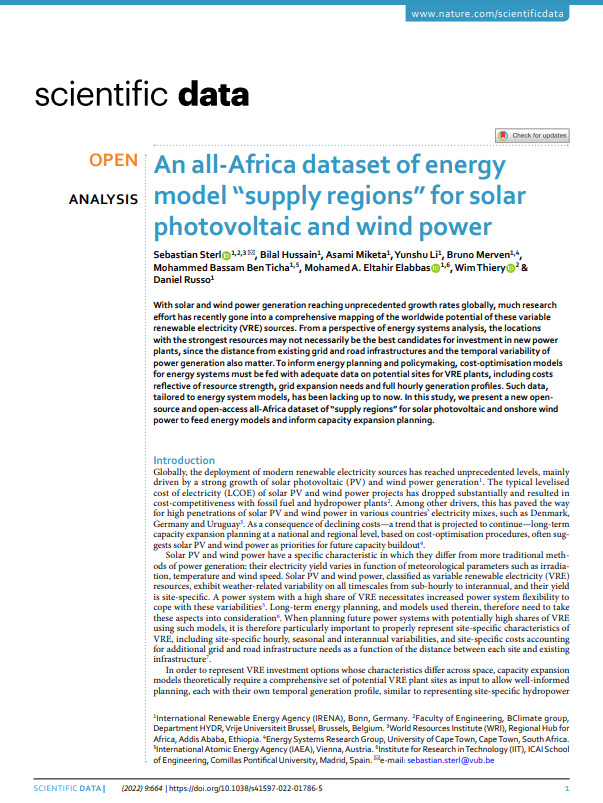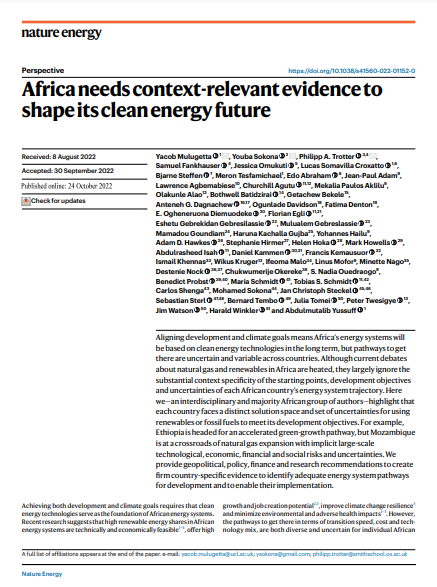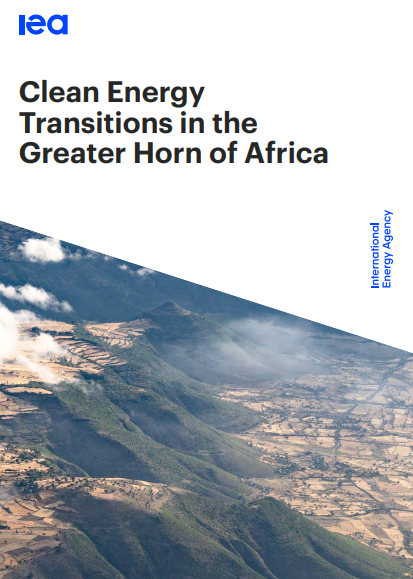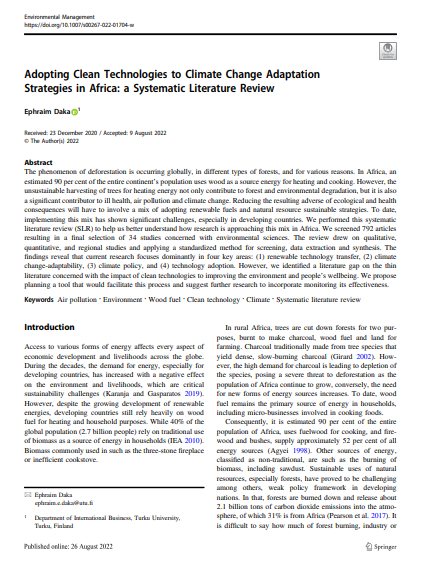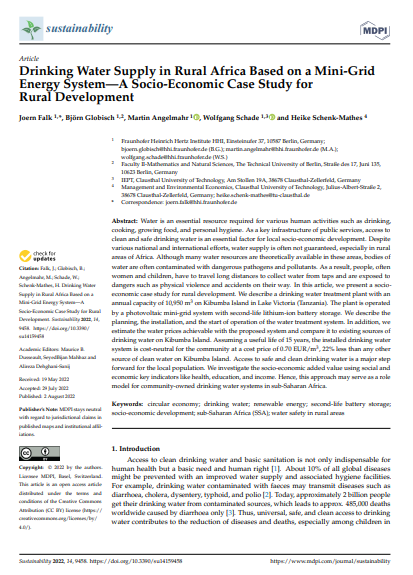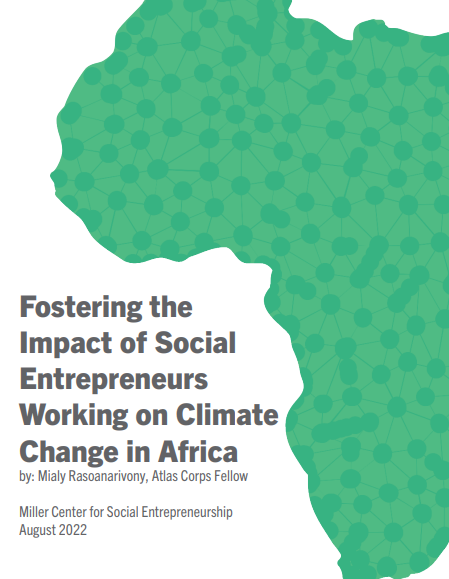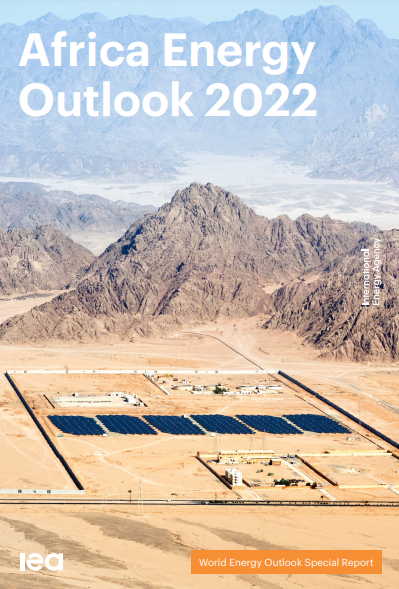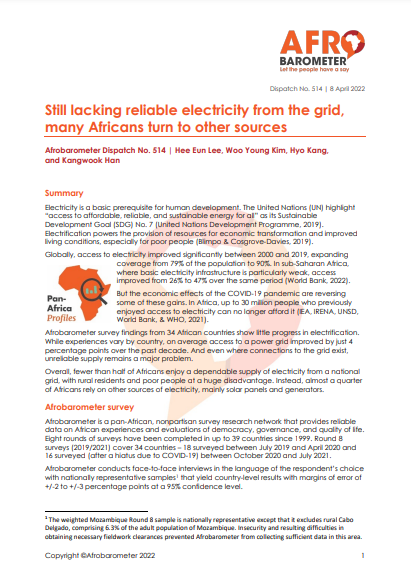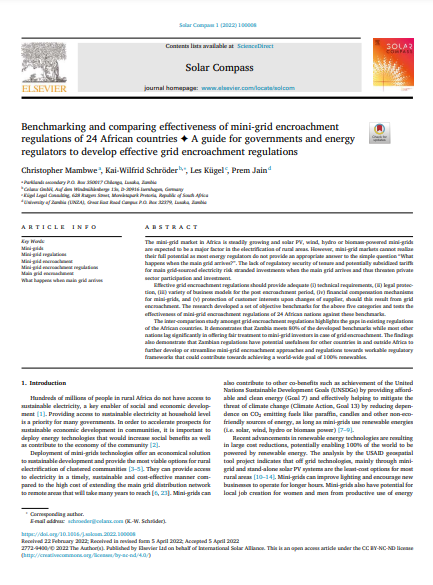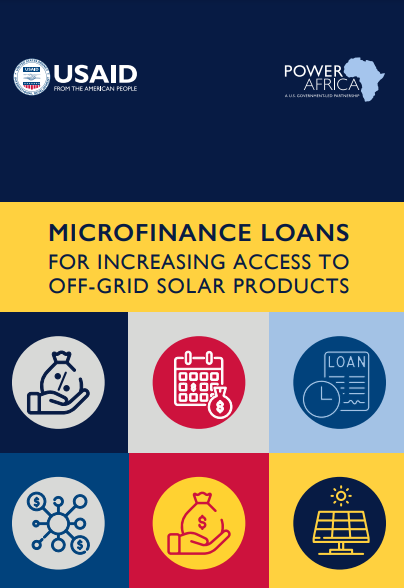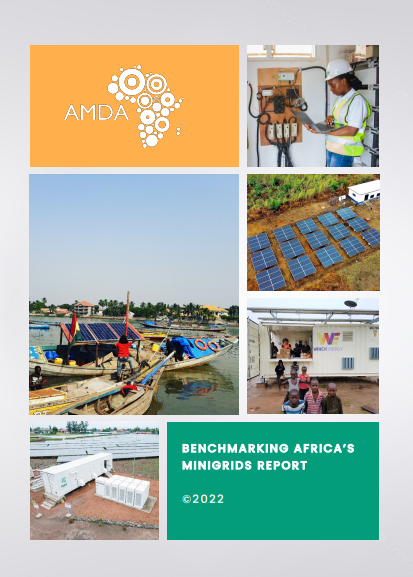We post here the relevant reports for the power sector in Africa. Feel free to join our efforts and share us any other you may have found. We'd be glad to add them to the list. Just sent an email to This email address is being protected from spambots. You need JavaScript enabled to view it.
Browse by Region:
Publication date: 14 June 2023
Author: African Development Bank Group
Description: SEFA 2.0 continued its momentum in 2022, unlocking private sector-led renewable energy and energy efficiency projects across the African continent, despite new challenges arising from Russia’s invasion of Ukraine as well as extreme climate events such as droughts and hurricanes in various parts of the continent.
Visit Website >>
Publication date: 27 February 2023
Author: Springer Nature
Description: Groundwater pumping using photovoltaic energy has the potential to transform water services in poorly served areas. Here we develop a numerical model that uses openly available data to simulate the abstraction capacities of photovoltaic water pumping systems across Africa. The first contribution of this article is the detailed design of the large-scale model to include realistic geological constraints on the depth of pumping and sub-hourly irradiance time series.
Download Report >>
Visit Website >>
Publication date: 6 January 2023
Author: Springer Nature
Description: Promoting a transition to low-carbon energy systems to mitigate climate change requires an optimization of renewable energy (RE) planning. However, curated data for the most promising RE technologies, hydro-, wind and solar power, are missing, which limits data-based decision-making support. Here, a spatially explicit database for existing and proposed renewable power plants is provided: The Renewable Power Plant database for Africa (RePP Africa) encompasses 1074 hydro-, 1128 solar, and 276 wind power plant records. For each power plant, geographic coordinates, country, construction status, and capacity (in megawatt) are reported.
Download Report >>
Visit Website >>
Publication date: January 2023
Author: IRENA
Description: African nations use long-term scenarios and energy planning tools to inform national planning. When the right institutional framework is in place, countries can assess alternative pathways to ensure energy access for all, mainstream the use of large- and small-scale renewables, and advance toward a just and sustainable energy system, while building consensus on the desired energy future.
Download Report >>
Visit Website >>
Publication date: 2023
Author: AFSIA
Description: AFSIA’s annual Africa Solar Outlook report is the most complete review of the status of solar in Africa, country by country.
Each country is presented through different angles: national solar and renewable energy objectives, current grid tariffs per customer segment, installed PV capacity per segment, all applicable policy and regulation, and finally notable market developments in the country.
Visit Website >>
Publication date: 2023
Author: SEforALL
Description: This report, by Sustainable Energy for All, supported by Bloomberg Philanthropies, ClimateWorks Foundation, African Climate Foundation and Chinese Renewable Energy Industries Association, has assessed the potential of renewable energy in Africa and creates a roadmap for African countries to localize manufacturing. The report draws on multiple sources, including economic analysis from McKinsey & Company.
Download Report >>
Visit Website >>
Publication date: 28 December 2022
Author: Energy, Sustainability and Society
Description: Building on the contributions to the article collection “The Governance of Sustainable Energy Transitions in the Global South “, this editorial offers a sketch for a research agenda on transitions research with a main focus on Africa. Still being ill-defined in its concrete contours, this research agenda engages with the central themes of heterogeneity, politics, and the material basis of energy transitions.
Download Report >>
Visit Website >>
Publication date: 6 December 2022
Author: AIP Conference Proceedings
Description: Crop Area Integrated Photovoltaics (CAIPV) systems yield electricity and crops on the same area of land. Most CAIPV research and commercial activity over the last decade has taken place in temperate countries of the Global North; activity in Africa has been comparatively very limited. Depending on several factors, the shade from the PV arrays may cause crop yields to decrease, increase, or remain close to control. It is expected that yields of many crops would increase on sunny arid sites in Africa.
Download Report >>
Visit Website >>
Publication date: 9 November 2022
Author: Bloomberg Finance
Description: The ongoing global transition from high to low carbon emitting sources of energy has the potential to transform Africa: mass deployment of new, low-cost clean technologies should trigger billions in investment, expand energy access to millions, and help mitigate the worst effects of climate change. Despite the continent’s abundant natural resources that make clean power the least-cost option today, it has reaped limited benefits from the energy transition. In fact, in 2021, Africa’s clean energy investment fell to its the lowest level since 2011 – of the $434 billion invested globally to build wind, solar, and other clean power projects, only 0.6% or $2.6 billion, went to Africa.
Download Report >>
Visit Website >>
Publication date: 31 October 2022
Author: Springer Nature
Description: With solar and wind power generation reaching unprecedented growth rates globally, much research effort has recently gone into a comprehensive mapping of the worldwide potential of these variable renewable electricity (VRE) sources. From a perspective of energy systems analysis, the locations with the strongest resources may not necessarily be the best candidates for investment in new power plants, since the distance from existing grid and road infrastructures and the temporal variability of power generation also matter.
Download Report >>
Visit Website >>
Publication date: 24 October 2022
Author: Nature Energy
Description: Aligning development and climate goals means Africa’s energy systems will be based on clean energy technologies in the long term, but pathways to get there are uncertain and variable across countries. Although current debates about natural gas and renewables in Africa are heated, they largely ignore the substantial context specificity of the starting points, development objectives and uncertainties of each African country’s energy system trajectory.
Download Report >>
Visit Website >>
Publication date: October 2022
Author: IEA
Description: The future of Africa’s energy sector is important globally. The International Energy Agency (IEA) is actively supporting evidence-based energy policy making in African countries with the aim of achieving affordable and clean energy, in line with United Nations Sustainable Development Goal (SDG) 7. This includes ensuring universal access for all, promoting increased energy security and affordability, and accelerating the development of clean energy systems across Africa, through a sustainable and accelerated regional energy system transformation.
Download Report >>
Visit Website >>
Publication date: 26 August 2022
Author: Springer
Description: The phenomenon of deforestation is occurring globally, in different types of forests, and for various reasons. In Africa, an estimated 90 per cent of the entire continent’s population uses wood as a source energy for heating and cooking. However, the unsustainable harvesting of trees for heating energy not only contribute to forest and environmental degradation, but it is also a significant contributor to ill health, air pollution and climate change. Reducing the resulting adverse of ecological and health consequences will have to involve a mix of adopting renewable fuels and natural resource sustainable strategies.
Download Report >>
Publication date: 2 August 2022
Author: MDPI
Description: Water is an essential resource required for various human activities such as drinking, cooking, growing food, and personal hygiene. As a key infrastructure of public services, access to clean and safe drinking water is an essential factor for local socio-economic development. Despite various national and international efforts, water supply is often not guaranteed, especially in rural areas of Africa. Although many water resources are theoretically available in these areas, bodies of water are often contaminated with dangerous pathogens and pollutants. As a result, people, often women and children, have to travel long distances to collect water from taps and are exposed to dangers such as physical violence and accidents on their way. In this article, we present a socio-economic case study for rural development.
Download Report >>
Visit Website >>
Publication date: August 2022
Author: Miller Center for Social Entrepreneurship
Description: The African continent continues to be massively affected by climate change, driving its countries to be ever more sensitive to vital poverty-related needs like access to energy, water, and agriculture. Social entrepreneurship is one key answer to unlock sustainable development. African countries living with extreme poverty are the most vulnerable to climate change because those two scourges overburden their population. This means that many challenges await Africa given that the continent has 9 out of the top 10 countries with the highest poverty rate in the world.
Download Report >>
Visit Website >>
Publication date: June 2022
Author: IEA
Description: Africa is already facing more severe climate change than most other parts of the world, despite bearing the least responsibility for the problem. With nearly one‐fifth of the world’s population today, Africa accounts for less than 3% of the world’s energy‐related carbon dioxide (CO2) emissions to date and has the lowest emissions per capita of any region. Africans are already disproportionately experiencing the negative effects of climate change, including water stress, reduced food production, increased frequency of extreme weather events and lower economic growth – all of which are fuelling mass migration and regional instability.
Download Report >>
Visit Website >>
Publication date: 8 April 2022
Author: Afrobarometer
Description: Electricity is a basic prerequisite for human development. The United Nations (UN) highlight “access to affordable, reliable, and sustainable energy for all” as its Sustainable Development Goal (SDG) No. 7 (United Nations Development Programme, 2019). Electrification powers the provision of resources for economic transformation and improved living conditions, especially for poor people (Blimpo & Cosgrove-Davies, 2019).
Globally, access to electricity improved significantly between 2000 and 2019, expanding coverage from 79% of the population to 90%. In sub-Saharan Africa, where basic electricity infrastructure is particularly weak, access improved from 26% to 47% over the same period (World Bank, 2022).
Download Report >>
Visit Website >>
Publication date: 5 April 2022
Authors: Solar Compass/Elsevier
Description: The mini-grid market in Africa is steadily growing and solar PV, wind, hydro or biomass-powered mini-grids are expected to be a major factor in the electrification of rural areas. However, mini-grid markets cannot realize their full potential as most energy regulators do not provide an appropriate answer to the simple question “What happens when the main grid arrives?”. The lack of regulatory security of tenure and potentially subsidized tariffs for main grid-sourced electricity risk stranded investments when the main grid arrives and thus threaten private sector participation and investment.
Download Report >>
Visit Website >>
Publication date: 2 February 2022
Author: USAID
Description: This document aims to serve as a resource for off-grid solar (OGS) companies, microfinance institutions (MFIs), and local banks (hereafter referred to together as MFIs) on providing loans for off-grid solar products in sub-Saharan Africa. The market for off-grid solar technology in this region is growing rapidly, and OGS companies and MFIs are naturally suited to helping each other enter and grow in this market. Moreover, by partnering to design and market loans for off-grid solar products, OGS companies and MFIs can help to increase access to energy, particularly for rural, low-income households, farmers, and small businesses. This document offers lessons learned from partnerships between MFIs and OGS companies, advice on gender and social inclusion, and information about piloting and scaling solar loans.
Download Report >>
Visit Website >>
Publication date: 2022
Author: AMDA
Description: Minigrids continue to gain traction as an integral component of the global energy ecosystem. With over 590 million Africans still living without access to electricity, major institutions such as the World Bank and the International Energy Agency (IEA) estimate that minigrids are essential to providing electricity to approximately half of all unelectrified communities in Africa. As governments revise their electrification plans, there is growing interest to mainstream minigrids, while donors and foundations continue to publicly commit funding to the industry and new businesses emerge to support the overall ecosystem. However, despite the increasing interest, scale has remained elusive. This report aims to provide clear, neutral and quantitative evidence that can support decision makers as they determine pathways to universal electrification.
Download Report >>





